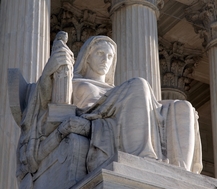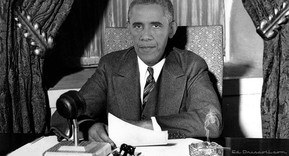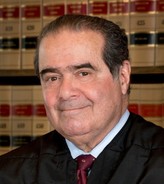
In the eleven days since Justice Scalia died, the nation has been swept up in a tsunami of intense sentiment, research, and opinion about the Constitution, history, and the way our "three branches" should intertwine.
Here's a fascinating tidbit that local readers (both "left and right") might want to reflect on. While the politicos will inevitably make a hash of this trying beat each other up, we might be better served if they made a truce ... and tried a little experiment.
Weekly Standard, February 29, 2016
By JEFFREY H. ANDERSON
To hear some on the left tell it, the Supreme Court would be hamstrung if it had to function for a year or more without a ninth justice. What to do in the event of a 4-4 tie? This would not have been viewed as a problem, however, by America's Founders, who created a Court with an even number of justices—six. In fact, Marbury v. Madison, arguably the most important case in the Court's 226-year history, was decided by a six-justice Court.
The Constitution, of course, leaves it up to Congress to decide how many justices will serve on the Supreme Court. In 1789, Congress passed, and President Washington signed, the Judiciary Act. That law determined that the number of Supreme Court justices should be six. The Congress of that day was full of men who had been at Independence Hall two years earlier and had participated in the writing of the Constitution, so they presumably knew what they were doing.
With a six-justice Court, a 3-3 opinion simply meant the Court wouldn't overturn a lower federal court ruling but instead would let it stand (or wouldn't alter the status quo in a case taken up by the Court as a matter of original jurisdiction). One effect of a six-person Court was that it took two-thirds of the Court (4 votes to 2) to declare unconstitutional a law duly passed by Congress or a state legislature. With a nine-person Court, 5-4 rulings are commonplace: In modern times, the trajectory of the nation has changed repeatedly on the personal whims of an Anthony Kennedy or a Sandra Day O'Connor. An even-numbered Court seems to be more conducive to judicial restraint.
From February 1790, when the Court first convened in the original capital of New York City, until March 1807 (when Thomas Todd became an associate justice on the John Marshall Court after having been nominated by Thomas Jefferson), Congress didn't change the number of justices.Marbury v. Madison was a unanimous decision by the six justices in 1803. So much for not being able to get anything done with an even number.
Indeed, when Congress increased the number of justices to seven in 1807, it doesn't seem that moving to an odd number had anything to do with it. In The Supreme Court in United States History, Charles Warren writes that the addition of a seventh justice was a function of an era when Supreme Court justices had to "ride circuit," serving on federal circuit courts. The need for an extra justice was "impelled by the increase of business and population in the Western Districts of Kentucky, Tennessee and Ohio, and by the necessity of bringing into the Court some lawyer versed in the peculiar land laws of those States."
The left would likely respond by saying that what worked in the Founding era wouldn't work today, but the truth is that the Court worked far better in 1790 or 1806 than it did in 1973 or 2015. Judicial review is meant only to void acts that violate, as Alexander Hamilton put it, the "manifest tenor" (obvious meaning) of the Constitution. Justices are supposed to adhere to the clear-violation standard, which holds that an act must be unconstitutional beyond a reasonable doubt for the Court to be justified in voiding it. Justice Antonin Scalia adhered to the clear-violation standard of constitutional review.
Returning to an even number of justices, if only for a year, would offer an additional level of protection against those justices who are inclined to eschew the clear-violation standard and impose their own wills. With an even number of justices, overturning the actions of the other, more representative branches of government would require at least a two-vote margin.
Not only will the Court survive just fine with an even number of justices for the next year or so, it may even do the Court some good.



 RSS Feed
RSS Feed
